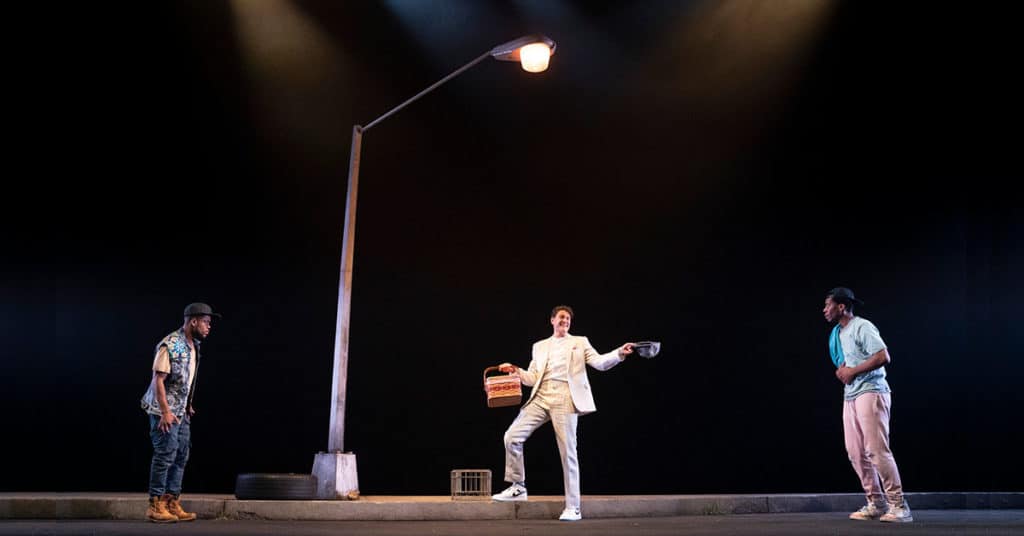Pass Over on Broadway at the August Wilson Theatre in the Times Square Theatre District starts previews August 4 for a September 12 opening that runs through October 10, 2021. From $39 (depending on day of the week). passoverbroadway.com
This is the second show and first play to return to Broadway after the pandemic shutdown. It is also the first play by a Black playwright to be performed at the August Wilson Theatre. Interestingly, the theatre’s namesake, Tony and Pulitzer Prize-winning American playwright August Wilson (1945-2005) has been called the “theater’s poet of Black America.”
“Pass Over” was written by Antoinette Nwandu. She is Harvard University, University of Edinburgh and Tisch School of the Arts at NYU. Nwandu has done a lot of work in Off-Broadway New York. Great roles for Black performers usually requires great Black writers. The deep character study Nwandu has written proves she is well on her way.
The play is directed by Obie award winner Danya Taymor.
The story is a version of Samuel Beckett’s “Waiting for Godot” (1953) the classic French tragicomedy about waiting for something that never comes. It also draws from the biblical story of the Exodus.
Pass Over

This is challenging but important theatre. Heartfelt hope clashes with the hard realities of living Black (Indigenous, Latin, or Asian) in America. There’s the seemingly blind but kind White America which turns out to be a sham after all, never-ending police harassment, and accusers blaming you for their own trouble, just because you’re Black. There’s that helpless feeling of, “why me, I didn’t do anything?”
The play itself is easy to understand, but to deal with those insecure feelings we know so well, is challenging. This play makes you feel a lot.
The story is really simple. Two young Black guys, Moses and Kitch (Jon Michael Hill and Namir Smallwood), are hanging out and chatting under a street light, just like so many of us do (hombres de la esquina). They are talking about how hard it is to be Black in America and hoping, like many of us hope, that change may finally come and they can get off the block. The set is Chicago, but could be any New York City street.
The guys play a game of personal greeting with, “yo kill me now” answered by “bang, bang.” Their banter has the rhythm and flow of street poetry.
As they are chatting, a bubbly stranger walks in out of the darkness. He first seems innocent, but later turns threatening. A “po-pos” policeman waits menacingly in the shadows and periodically shows up to harass and abuse the guys. They are afraid to step out of the light because they know exactly what can happen.
Beckett put his characters under a tree. The street light places the story in an urban setting and creates a strong metaphoric contrast between light and darkness. The street corner is a great metaphor for community because that’s where a lot of urban life is.
Evil only has power when we hide it in the dark. It fades when you bring it into the light. Privileged audiences may think this is clever staging, but people of color live this reality every day of their lives. For people of color, stepping out of your doorway (even sleeping in your own house) can be life threatening in ways that most people with privilege can’t seem to grasp.
The actors have spoken about how draining it can be to make the play come alive on stage, and then walk out into the street where life imitates art. To understand the disorientation of a chronic threat, just think of COVID. It’s very tiring and truly amazing that anyone can function under such never-ending uncertainty.
Arriving at the Right Time and Place
Great art has a way of showing up when we need it, as if it has a mind of its own.
“Pass Over” premiered at Chicago’s Steppenwolf Theater in 2017. Spike Lee made a movie out of it that premiered at Sundance in 2018. You can watch that on Amazon Prime Video. The play ran Off Broadway at Lincoln Center’s Claire Tow Theatre in 2018.
Jon Michael Hill and Namir Smallwood deliver some great nuanced performances. Hill started with the original play in Chicago. Smallwood joined the cast at Lincoln Center’s Off-Broadway production.
Since the 2020 George Floyd murder exposed the hard cracks in our society, COVID gave us all a taste of chronic life-threatening fear, and the “Big Lie” folks have been trying to turn back the clock, “Pass Over” seems perfectly ripe for Broadway. It’s almost as if the story itself wanted to be seen at this time and place. It will be remembered forever now as a piece of Broadway history.
Beckett’s telling and the original “Pass Over” ended darkly. Playwright Nwandu changed this production’s ending to something more hopeful. It’s been said that she wanted to spare Black audiences more trauma after a very traumatic time, but turning darkness into light is essential to the African American and Latin experience. We take whatever shit we are given and grow flowers from it. It’s our cultural superpower.
“Pass Over” is an intense, but strikingly beautiful flower of a play. Go watch it bloom.
